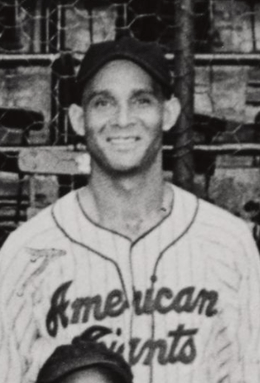Alvin Gipson facts for kids
Quick facts for kids Alvin Gipson |
|||
|---|---|---|---|
 |
|||
| Pitcher | |||
| Born: May 7, 1914 Shreveport, Louisiana |
|||
| Died: March 25, 1987 (aged 72) Shreveport, Louisiana |
|||
|
|||
| debut | |||
| 1941, for the Birmingham Black Barons | |||
| Last appearance | |||
| 1946, for the Birmingham Black Barons | |||
| Teams | |||
Independent/Minor
Major Leagues
|
|||
| Career highlights and awards | |||
|
|||
Alvin "Bubber" Gipson, Sr. (born May 7, 1914 – died March 25, 1987) was a talented American pitcher who played in the Negro leagues during the 1940s. These leagues were where African American baseball players showed off their skills when they weren't allowed to play in Major League Baseball. Alvin Gipson was from Shreveport, Louisiana, and he spent most of his baseball career as a key pitcher for the Birmingham Black Barons.
Contents
Alvin Gipson's Early Life
Alvin Gipson was born in Shreveport, Louisiana, on May 7, 1914. He grew up to become a well-known baseball player.
Playing Baseball
Starting Out: Independent Teams
Alvin Gipson started his baseball journey with independent teams. These teams traveled around to play games, often called "barnstorming tours." He played for teams like the Cincinnati Buckeyes and the New Orleans Crescent Stars. In 1939 or 1940, he had an amazing record of 22 wins and only 3 losses! People even said he could be "another Satchel Paige," who was a legendary pitcher.
Playing in the Negro Leagues
Alvin Gipson soon joined the Negro Major Leagues, where some of the best Black baseball players competed.
With the Chicago American Giants
In 1941, Alvin Gipson was part of the Chicago American Giants team. Even though specific game statistics aren't available for him from that time, he was in their team photo. He would later return to this team.
Becoming a Black Baron
Later in 1941, Gipson joined the Birmingham Black Barons. He became a very important part of their pitching team. With Gipson on their side, the Black Barons won the Negro American League (NAL) championship, called the "pennant," in both 1943 and 1944.
All-Star Moment
In 1942, Alvin Gipson was chosen to play in the Negro League All-Star Game. This special game featured the best players from the East and West teams. It was played to help raise money for the Army-Navy Relief Fund during World War II. Gipson pitched for the West team in Cleveland. He came in as a relief pitcher and played for 3 innings.
Amazing Strikeout Record
Alvin Gipson had a truly memorable game on August 21, 1943. He set a new Negro American League record by striking out 20 batters from the Philadelphia Stars! This happened in Birmingham, and the Black Barons won the game 5-1. Gipson was so good that he struck out all three batters in an inning four different times during the game, including the very last inning. One player, Marvin Williams, struck out against Gipson four times in that game. After his incredible performance, excited fans rushed onto the field to celebrate with him!
Serving His Country
On July 2, 1945, Alvin Gipson was drafted into the United States Army. He served his country during World War II.
Back to Baseball
After his time in the Army and leaving the Black Barons, Gipson continued to play baseball. He pitched for other independent teams like the Detroit Senators and the Cincinnati Crescents. Both of these teams were managed by Winfield Welch, who had also been his manager with the Birmingham Black Barons.
Return to Chicago
In 1949, Alvin Gipson went back to play for the Chicago American Giants, following his old manager Winfield Welch. He stayed with the team through the 1950 season. In October 1950, Gipson was even part of a Negro League All-Star team that played against a team of integrated Major League All-Stars.
His Legacy
Alvin Gipson passed away on March 25, 1987, at a hospital for veterans in his hometown of Shreveport, Louisiana. He had been sick for a short time. In 1999, a newspaper in Shreveport, The Times, recognized Gipson as one of the top 100 baseball players from the area. His amazing strikeout record and contributions to the Negro Leagues are still remembered today.

